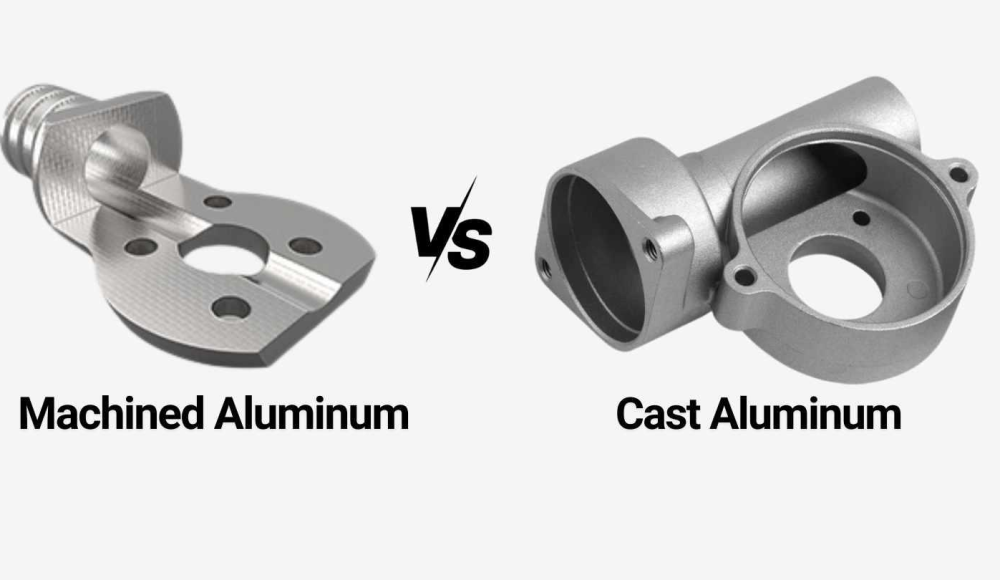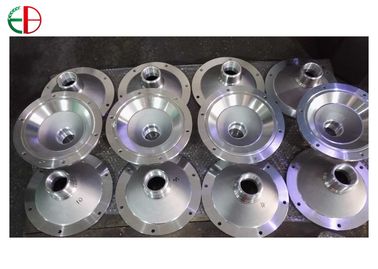The Future of Light Weight Aluminum Foundries: Developments and trends Shaping the Market
The light weight aluminum shop market is undergoing significant makeover. Secret trends highlight the significance of sustainability and effectiveness. Developments in smart manufacturing and automation are ending up being common. Factories are significantly concentrated on making use of recycled products. This change questions about future techniques and innovations. Exactly how will these changes impact production techniques and market dynamics? The answers may redefine the market landscape in unexpected ways.
Innovations in Smart Production Technologies
As the light weight aluminum shop sector progresses, developments in smart production innovations are ending up being progressively crucial for improving performance and performance. The combination of automation, expert system, and the Internet of Points (IoT) is transforming standard shop procedures. These technologies allow real-time monitoring of processes, permitting instant changes that optimize outcome and minimize waste.
Maker understanding algorithms assess production information to determine patterns and forecast maintenance requirements, lessening downtime. Robotics are increasingly used for repetitive tasks, freeing competent employees to concentrate on even more complicated challenges. Additionally, electronic twins-- digital models of physical processes-- help with simulations that can boost style and functional methods.
The adoption of these wise production modern technologies is driving affordable benefits in the light weight aluminum factory field. By simplifying operations and improving decision-making abilities, foundries can meet expanding market needs while preserving premium standards. The future of aluminum foundries is undeniably connected to these technological innovations.
Embracing Eco-Friendly Products and Processes
The light weight aluminum shop industry is increasingly concentrating on eco-friendly products and procedures to boost sustainability. This change includes the adoption of lasting material sourcing, energy-efficient production strategies, and efficient recycling and waste monitoring techniques. By integrating these techniques, factories intend to minimize their environmental influence while preserving competition out there.
Sustainable Material Sourcing
How can aluminum factories boost their sustainability initiatives? Lasting product sourcing has arised as an important approach in accomplishing this goal. By prioritizing recycled aluminum, shops can substantially reduce their environmental impact, as recycled products need much less energy and less resources contrasted to main aluminum manufacturing. Additionally, sourcing products from licensed distributors that abide by environmentally friendly methods promotes liable mining and decreases ecological influence. Shops are also checking out different materials, such as biopolymers and green coatings, to match standard light weight aluminum procedures. Working together with stakeholders, including vendors and environmental companies, cultivates innovation in sourcing approaches. Ultimately, embracing lasting material sourcing not only lines up with global sustainability goals however likewise placements aluminum shops as leaders in eco accountable manufacturing.
Energy-Efficient Manufacturing Strategies
Light weight aluminum foundries are increasingly adopting energy-efficient manufacturing strategies to match their lasting material sourcing campaigns. These techniques concentrate on lessening energy consumption throughout the production process. Advanced modern technologies, such as induction melting and enhanced casting procedures, are being carried out to minimize the total carbon impact. In addition, automation and smart manufacturing systems enhance functional efficiency, permitting far better power administration. Factories are additionally discovering the integration of renewable resource sources, such as solar and wind, to power their operations. By focusing on energy performance, aluminum factories not just lower production prices however also straighten themselves with international sustainability goals, guaranteeing an extra ecologically liable method to aluminum manufacturing while satisfying the increasing demand for eco-friendly methods in the sector.
Recycling and Waste Administration
Welcoming environmentally friendly materials and procedures, aluminum shops are prioritizing recycling and waste management strategies to enhance sustainability in their operations. By integrating closed-loop systems, these facilities are decreasing waste and making best use of source efficiency. Scrap aluminum, a readily offered product, is being reused on-site, significantly minimizing the need for virgin products and reducing power intake. Innovations in arranging and refining modern technologies additionally facilitate the recycling of aluminum, ensuring that even contaminated materials can be repurposed effectively. In addition, foundries are taking on lasting methods such as decreasing contaminated materials and promoting the usage of naturally degradable materials for packaging. This commitment to reusing not just lowers environmental effect but likewise improves the financial stability of aluminum factories in a competitive market.
The Role of Automation and Robotics
Automation and robotics are increasingly changing the light weight aluminum shop sector, substantially improving manufacturing performance. By incorporating advanced technologies, foundries can reduce labor prices while all at once improving security criteria for their labor force. This change not only simplifies procedures yet likewise positions the market for lasting development in a competitive market.
Boosted Production Efficiency
Revolutionizing production procedures, the integration of innovative robotics and automation innovations has actually come to be a cornerstone for aluminum foundries looking for enhanced effectiveness. These advancements streamline process, lower cycle times, and improve item high quality by lessening human mistake. Automated systems can monitor manufacturing lines in real-time, enabling immediate modifications that enhance output. On top of that, robotics assist in the handling of harmful products, making certain much safer workplace while increasing throughput. Predictive maintenance modern technologies additionally add to efficiency by preparing for tools failings, therefore lowering downtime. Therefore, aluminum factories can achieve greater consistency in their products while reacting a lot more promptly to market demands. This welcome of automation is establishing a new standard for efficiency and functional excellence within the sector.

Reducing Labor Expenses
The change towards progressed robotics and automation in aluminum factories not only improves production effectiveness yet also plays a significant duty in lowering labor prices. By incorporating automated systems, factories can lessen the dependence on manual work, which typically entails high earnings and training costs. Robotics enhance repeated jobs such as pouring, molding, and completing, enabling a higher output with fewer personnel. This technological change not just decreases labor-related costs however additionally boosts uniformity and high quality in manufacturing. Automation can run around the clock, making best use of operational hours without the associated costs of overtime or change differentials. Consequently, aluminum shops can attain significant savings while maintaining affordable prices in a progressing market landscape.
Improving Security Specifications
While standard aluminum factory operations commonly reveal workers to dangerous environments, the integration of robotics and automation greatly improves safety criteria within the industry. Automated systems can carry out risky tasks, such as liquified steel handling and hefty training, decreasing human exposure to unsafe problems. Furthermore, robotics can run in extreme temperature levels and hazardous atmospheres, successfully decreasing the danger of injury. Advanced keeping an eye on modern technologies and expert system warranty real-time security assessments, permitting immediate feedbacks to prospective dangers. Additionally, automation enhances operations, reducing the chance of crashes triggered by human mistake. Therefore, the adoption of these innovations not just enhances safety and security however also cultivates a much more efficient and effective functioning setting in light weight aluminum factories.
Enhancing Power Efficiency in Production
As aluminum factories seek to maintain competition in an evolving market, enhancing power performance in production has actually arised as a critical focus. By embracing innovative modern technologies such as high-efficiency melting furnaces and automated temperature controls, published here factories can especially lower power usage. Carrying out real-time surveillance systems enables accurate monitoring of power usage throughout the manufacturing procedure, allowing fast modifications to maximize effectiveness.
Additionally, moving to different energy sources, including renewable options, can further reduce the carbon impact. The combination of energy recovery systems, which recover waste warmth for reuse, is ending up being increasingly usual. Educating personnel in energy administration practices assures that every person entailed in the manufacturing procedure bears in mind energy use.
These campaigns not just lower functional costs however also straighten with worldwide sustainability objectives, placing aluminum foundries as liable gamers in the industry while improving their overall competition. - Aluminum Casting Company
Technologies in Recycling Aluminum
Technologies in reusing aluminum have gotten energy alongside efforts to enhance energy effectiveness in manufacturing. The aluminum more sector has actually embraced sophisticated innovations that improve the recycling process, minimizing energy consumption and environmental impact. Techniques such as hydrometallurgy and brand-new sorting modern technologies enhance the extraction of aluminum from scrap, improving return prices and making certain better recycled material.
Additionally, the development of closed-loop recycling systems allows shops to reuse aluminum without substantial deterioration in quality, making the procedure a lot more sustainable. Developments in logistics and collection, including improved monitoring systems and automated sorting, have additionally played an important duty in boosting the effectiveness of aluminum recovery. These developments not only add to a circular economy yet also help minimize the carbon impact connected with light weight aluminum production. As the need for lasting methods grows, these advancements position the aluminum shop field as a leader in accountable source administration.
Reacting To Market Demands and Customer Trends
Versatility has ended up being a cornerstone for light weight aluminum factories reacting to evolving market demands and consumer patterns. As sectors significantly prioritize sustainability, aluminum shops are changing towards green techniques, consisting of enhanced reusing procedures and minimized carbon footprints. This shift straightens with customer choices for ecologically responsible products, driving shops to introduce their offerings.
In addition, the rise of lightweight products in aerospace and automobile fields requires innovations in aluminum alloys and casting methods. Foundries are purchasing research study and advancement to produce high-strength, light-weight parts that meet strict efficiency criteria.
In addition, modification has actually gotten traction, with consumers seeking customized solutions. Aluminum factories are leveraging sophisticated production technologies, such as 3D printing, to accommodate particular customer requirements successfully. This responsiveness not only pleases customer needs however likewise settings aluminum factories competitively in a vibrant market landscape, ensuring their significance in an ever-changing commercial setting.

Frequently Asked Inquiries
How Do Light Weight Aluminum Foundries Impact Resident Economies?
Aluminum factories substantially impact neighborhood economic situations by creating tasks, stimulating need for neighborhood distributors, and adding to area development. Their operations usually cause boosted tax obligation profits, which can fund important public services and infrastructure enhancements.
What Are the Safety Rules for Aluminum Shop Workers?
Safety regulations for light weight aluminum foundry employees consist of obligatory personal safety equipment, correct air flow systems, normal training on harmful materials, and adherence to standards set try this out by job-related health and wellness administrations to lessen dangers and warranty worker safety. - Aluminum Casting Company
Just How Does Aluminum Recycling Affect Global Supply Chains?
Aluminum reusing significantly reduces need for basic materials, boosts source effectiveness, and supports rates. This shift effects international supply chains by cultivating a round economy, promoting sustainability, and ensuring a more durable market in fluctuating markets.
What Career Opportunities Exist in the Aluminum Factory Sector?
Various career possibilities exist in the aluminum foundry sector, including functions in design, quality assurance, production management, and research and growth. Skilled labor settings such as mold makers and device operators are additionally popular.
How Do International Profession Plans Influence Light Weight Aluminum Foundries?
International trade plans considerably influence aluminum shops by affecting import tolls, supply chain dynamics, and market access. These aspects can influence operational prices, competitiveness, and general success within the international light weight aluminum manufacturing landscape.
By focusing on recycled light weight aluminum, foundries can significantly minimize their ecological footprint, as recycled materials call for much less energy and less resources compared to main light weight aluminum production. Light weight aluminum foundries are significantly taking on energy-efficient manufacturing strategies to complement their sustainable product sourcing campaigns. Automation and robotics are progressively changing the aluminum shop sector, substantially boosting manufacturing efficiency. The change in the direction of progressed robotics and automation in aluminum shops not just enhances production efficiency yet also plays a substantial function in decreasing labor expenses. As aluminum factories seek to preserve competitiveness in an evolving market, boosting power performance in manufacturing has actually emerged as an essential emphasis.